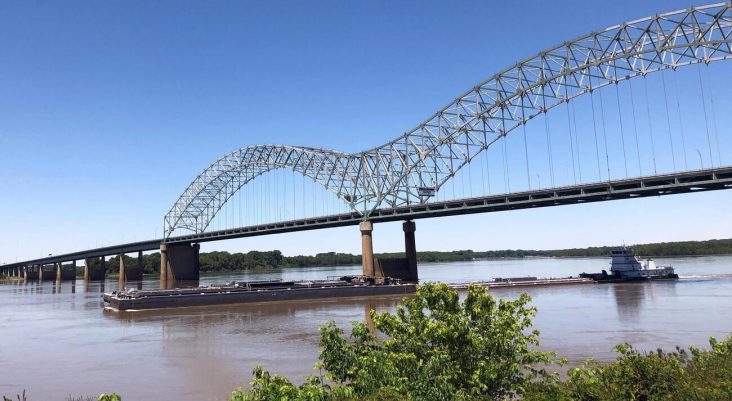Mississippi River at 8th lowest level on record; Arkansas under high wildfire risk
by October 3, 2022 9:47 am 3,490 views

Drought conditions have worsened throughout the Arkansas Delta and there will be impacts to farmers as the harvest season unfolds. The lack of rain has been so severe that the Mississippi River is at its lowest level in a decade and it is the eighth lowest level ever recorded for the river, National Weather Service Meteorologist Samantha Brown told Talk Business & Politics.
There hasn’t been any precipitation in the region in almost two weeks and that won’t change in the short-term forecast, and there’s nothing in the long-term modeling that indicates any change at this point, Brown said.
“Drought conditions are worsening. There’s no chance of rain that I can see for the next seven days and even further,” she said.
The entire Delta is under abnormally dry, moderate or severe drought conditions, according to the U.S. Drought Monitor. A low-pressure trough has stalled over the mid-South region, and there is no indication it will move anytime soon, Brown said.
Another problem caused is that low pressure leads to less humidity. The lack of humidity in the mornings is also making the ground drier.
Wildfire dangers have significantly increased statewide in recent weeks. The NWS lists all 75 counties in Arkansas in the high wildfire danger category due to the lack of rain, humidity and gusty winds. About half of the state’s counties are under a burn ban.
The only county in Northeast Arkansas that is under a burn ban is Clay County, and the ban doesn’t include a ban on agricultural burning – yet.
Many farmers in the region burn their fields to get rid of the organic refuse left in their fields. The practice is controversial. It impacts air quality for residents in the region and can cause health problems for those with breathing ailments. At times, the plumes of smoke cover roadways causing driving hazards.
The lack of rain may benefit farmers as they harvest, but once those crops reach the Mississippi River new problems will arise. The river’s low waters are impacting barge traffic.
Water levels on the Lower Mississippi River (LMR) are dangerously low in some areas and may slow or even stop barge traffic just as corn and soybean harvest starts, Progressive Farmer analyst Mary Kennedy said. Most of the fall export business is for soybeans at the U.S. Gulf and the persisting low water can be problematic for shippers who need to move the new-crop harvest down river, she added.
The USDA noted in its weekly Grain Transportation Report for the week ended Sept. 17, barged grain movements totaled 209,600 tons. This was 16% more than the previous week and 130 grain barges moved down river, which was 25 fewer barges than the prior week, she said.
The second half of September and October are typically dry months in the region, Brown said. The drought conditions during the summer have exacerbated the problem this year, she added.
